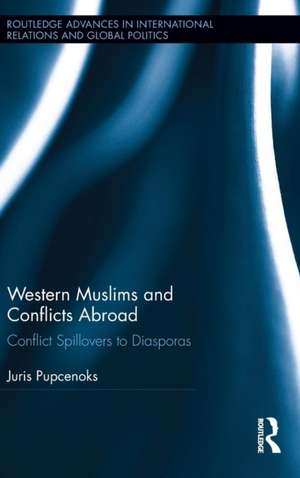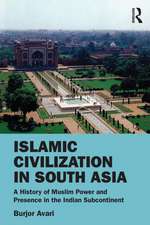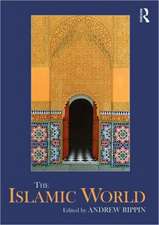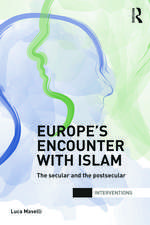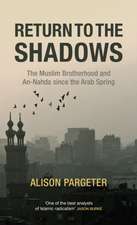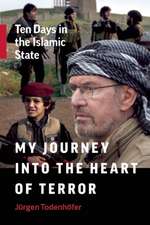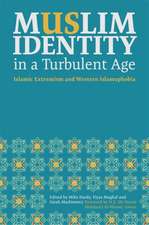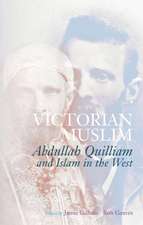Western Muslims and Conflicts Abroad: Conflict Spillovers to Diasporas: Routledge Advances in International Relations and Global Politics
Autor Juris Pupcenoksen Limba Engleză Hardback – 17 dec 2015
The key findings show that, with regards to activism in response to foreign policy events, Western Muslim communities primarily politically mobilize on the basis of their ethnic divisions. Nevertheless, one notable exception is the Arab-Israeli conflict, which is viewed through the Islamic lenses; and the common Islamic identity is important in driving mobilization domestically in response to Islamophobia, and counterterrorism policies and practices perceived to be discriminatory. Certain organizational arrangements involving minority community leaders, law enforcement, and government officials help to effectively contain excitable youth who may otherwise engage in deviant behavior. Overall, the following factors contribute to the creation of an environment where reactive conflict spillover is more likely to occur: policies allowing immigration of violent radicals, poor economic integration without extensive civil society inter-group ties, the presence of radical groups, and connections with radical networks abroad.
| Toate formatele și edițiile | Preț | Express |
|---|---|---|
| Paperback (1) | 304.90 lei 6-8 săpt. | |
| Taylor & Francis – 18 oct 2017 | 304.90 lei 6-8 săpt. | |
| Hardback (1) | 702.37 lei 6-8 săpt. | |
| Taylor & Francis – 17 dec 2015 | 702.37 lei 6-8 săpt. |
Din seria Routledge Advances in International Relations and Global Politics
-
 Preț: 383.48 lei
Preț: 383.48 lei -
 Preț: 310.55 lei
Preț: 310.55 lei -
 Preț: 188.83 lei
Preț: 188.83 lei -
 Preț: 152.86 lei
Preț: 152.86 lei -
 Preț: 311.59 lei
Preț: 311.59 lei - 9%
 Preț: 1003.12 lei
Preț: 1003.12 lei -
 Preț: 317.91 lei
Preț: 317.91 lei - 8%
 Preț: 390.08 lei
Preț: 390.08 lei -
 Preț: 377.82 lei
Preț: 377.82 lei -
 Preț: 303.47 lei
Preț: 303.47 lei - 18%
 Preț: 1170.74 lei
Preț: 1170.74 lei - 18%
 Preț: 1051.55 lei
Preț: 1051.55 lei - 18%
 Preț: 1220.46 lei
Preț: 1220.46 lei - 28%
 Preț: 850.99 lei
Preț: 850.99 lei - 18%
 Preț: 1056.32 lei
Preț: 1056.32 lei - 18%
 Preț: 1053.57 lei
Preț: 1053.57 lei - 18%
 Preț: 1057.89 lei
Preț: 1057.89 lei - 18%
 Preț: 1056.32 lei
Preț: 1056.32 lei - 18%
 Preț: 1066.09 lei
Preț: 1066.09 lei - 18%
 Preț: 1062.26 lei
Preț: 1062.26 lei - 18%
 Preț: 1056.32 lei
Preț: 1056.32 lei - 15%
 Preț: 449.41 lei
Preț: 449.41 lei - 25%
 Preț: 300.01 lei
Preț: 300.01 lei - 18%
 Preț: 1167.36 lei
Preț: 1167.36 lei - 28%
 Preț: 820.56 lei
Preț: 820.56 lei - 18%
 Preț: 1060.87 lei
Preț: 1060.87 lei - 18%
 Preț: 1270.98 lei
Preț: 1270.98 lei - 18%
 Preț: 1167.71 lei
Preț: 1167.71 lei - 18%
 Preț: 1112.21 lei
Preț: 1112.21 lei - 18%
 Preț: 997.11 lei
Preț: 997.11 lei -
 Preț: 427.12 lei
Preț: 427.12 lei - 18%
 Preț: 1057.40 lei
Preț: 1057.40 lei -
 Preț: 355.58 lei
Preț: 355.58 lei - 18%
 Preț: 1057.75 lei
Preț: 1057.75 lei - 18%
 Preț: 1115.33 lei
Preț: 1115.33 lei - 18%
 Preț: 1052.89 lei
Preț: 1052.89 lei - 26%
 Preț: 850.37 lei
Preț: 850.37 lei -
 Preț: 389.38 lei
Preț: 389.38 lei - 18%
 Preț: 1120.55 lei
Preț: 1120.55 lei - 18%
 Preț: 1059.93 lei
Preț: 1059.93 lei - 18%
 Preț: 1059.84 lei
Preț: 1059.84 lei - 18%
 Preț: 951.96 lei
Preț: 951.96 lei - 18%
 Preț: 1058.79 lei
Preț: 1058.79 lei - 18%
 Preț: 1061.81 lei
Preț: 1061.81 lei - 48%
 Preț: 572.55 lei
Preț: 572.55 lei - 18%
 Preț: 1059.84 lei
Preț: 1059.84 lei - 18%
 Preț: 1000.27 lei
Preț: 1000.27 lei - 18%
 Preț: 1056.28 lei
Preț: 1056.28 lei - 18%
 Preț: 1057.75 lei
Preț: 1057.75 lei
Preț: 702.37 lei
Preț vechi: 856.54 lei
-18% Nou
Puncte Express: 1054
Preț estimativ în valută:
134.42€ • 139.81$ • 110.97£
134.42€ • 139.81$ • 110.97£
Carte tipărită la comandă
Livrare economică 15-29 aprilie
Preluare comenzi: 021 569.72.76
Specificații
ISBN-13: 9781138915527
ISBN-10: 1138915521
Pagini: 244
Ilustrații: 4
Dimensiuni: 152 x 229 x 16 mm
Greutate: 0.5 kg
Ediția:1
Editura: Taylor & Francis
Colecția Routledge
Seria Routledge Advances in International Relations and Global Politics
Locul publicării:Oxford, United Kingdom
ISBN-10: 1138915521
Pagini: 244
Ilustrații: 4
Dimensiuni: 152 x 229 x 16 mm
Greutate: 0.5 kg
Ediția:1
Editura: Taylor & Francis
Colecția Routledge
Seria Routledge Advances in International Relations and Global Politics
Locul publicării:Oxford, United Kingdom
Public țintă
Postgraduate and UndergraduateCuprins
1. Introduction 2. Reactive Political Mobilization and Conflict Spillover 3. Pakistanis in London, Arabs in Detroit Transnational Mobilization 4. The Role of Triggers 5. The Importance Of Ethnic Fragmentation Reactive Conflict Spillover 6. Violent and Peaceful Mobilization-Pakistanis in London 7. Generally Peaceful Protest-Arab Muslims in Detroit 8. Similar Communities, Different Outcomes
Descriere
Juris Pupcenoks develops a conceptual and theoretical explanation for why reactive conflict spillovers (political violence in response to conflicts abroad) occur in some migrant-background communities in the West but not in others. Using a rigorous, mixed-methods case study analysis, Pupcenoks comparatively analyses the reactions of the Pakistani community in London and the Arab-Muslim community in Detroit to the wars in Afghanistan and Iraq during the decade following 9/11. The key findings show that, with regards to activism in response to foreign policy events, Muslim migrant communities primarily politically mobilize on the basis of their ethnicity (not religion).
